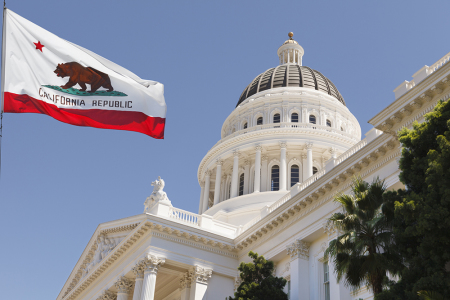DOJ warns Calif. Gov. Newsom not to discriminate against churches in reopening plans
California State Capitol building with state flag in Sacramento on a windy summer day with clear sky. | Getty/Stock photo
The U.S. Department of Justice has urged California officials to do more to protect the rights of houses of worship regarding orders aimed at limiting gatherings at certain venues to prevent the spread of COVID-19.
Eric Dreiband, assistant attorney general for the DOJ’s Civil Rights Division, sent a letter to California Gov. Gavin Newsom Tuesday regarding what he described as “several civil rights concerns with the treatment of places of worship” in the state’s reopening plans.
“Laws that do not treat religious activities equally with comparable nonreligious activities are subject to heightened scrutiny under the Free Exercise Clause of the First Amendment,” wrote Dreiband.
“Religious gatherings may not be singled out for unequal treatment compared to other nonreligious gatherings that have the same effect on the government’s public health interest, absent the most compelling reasons.”
Dreiband specifically cited Executive Orders N-33-20 and N-60-20 as areas where these religious liberty concerns were being raised.
Executive Order N-33-20, which was issued in March, restricted in-person worship gatherings while allowing for an “expansive” list of nonreligious gatherings to continue.
“California has not shown why interactions in offices and studios of the entertainment industry … are included on the list of being allowed with social distancing where telework is not practical, while gatherings with social distancing for purposes of religious worship are forbidden, regardless of whether remote worship is practical or not,” continued the letter.
The DOJ added that executive order N-60-20, issued in May and centered on reopening the state, shows “more pronounced unequal treatment of faith communities."
Under California's plan, in-person worship will not be allowed until stage three, while schools, restaurants, factories, and other secular gatherings will be allowed to reopen in stage two.
The U.S. Department of Justice has urged California officials to do more to protect the rights of houses of worship regarding orders aimed at limiting gatherings at certain venues to prevent the spread of COVID-19.
Eric Dreiband, assistant attorney general for the DOJ’s Civil Rights Division, sent a letter to California Gov. Gavin Newsom Tuesday regarding what he described as “several civil rights concerns with the treatment of places of worship” in the state’s reopening plans.
“Laws that do not treat religious activities equally with comparable nonreligious activities are subject to heightened scrutiny under the Free Exercise Clause of the First Amendment,” wrote Dreiband.
“Religious gatherings may not be singled out for unequal treatment compared to other nonreligious gatherings that have the same effect on the government’s public health interest, absent the most compelling reasons.”
Dreiband specifically cited Executive Orders N-33-20 and N-60-20 as areas where these religious liberty concerns were being raised.
Executive Order N-33-20, which was issued in March, restricted in-person worship gatherings while allowing for an “expansive” list of nonreligious gatherings to continue.
“California has not shown why interactions in offices and studios of the entertainment industry … are included on the list of being allowed with social distancing where telework is not practical, while gatherings with social distancing for purposes of religious worship are forbidden, regardless of whether remote worship is practical or not,” continued the letter.
The DOJ added that executive order N-60-20, issued in May and centered on reopening the state, shows “more pronounced unequal treatment of faith communities."
Under California's plan, in-person worship will not be allowed until stage three, while schools, restaurants, factories, and other secular gatherings will be allowed to reopen in stage two.
“Whichever level of restrictions you adopt, these civil rights protections mandate equal treatment of persons and activities of a secular and religious nature,” the DOJ said.
Kelly Shackelford, president of the First Liberty Institute, a law firm that has represented churches suing over various state restrictions to in-person worship, lauded the DOJ's letter.
“Attorney General Bill Barr is a great hero to people of faith. The same people who shop at malls, work in factories, and eat in restaurants go to churches, synagogues, and mosques,” said Shackelford in an emailed statement. “Suggesting shoppers can be trusted to safely social distance, but churchgoers cannot is discrimination.”
Earlier this month, a federal judge ruled that Newsom had the right to restrict church services for public health reasons as part of the state's response to curb the spread of the new coronavirus.
U.S. District Court Judge John A. Mendez ruled that the church suing California, Cross Culture Christian Center in Lodi, “failed to produce any evidence that their in-person gatherings pose little threat of increasing COVID-19’s spread.”
“The understandably cherished freedom to exercise sincerely-held religious beliefs ‘does not relieve an individual of the obligation to comply with a valid and neutral law of general applicability,’” wrote Mendez, referencing case law.
“More specifically, when a neutral law of general application places incidental limits on a religious exercise, ‘the right to practice religion freely does not include liberty to expose the community ... to communicable disease.’”

No comments:
Post a Comment